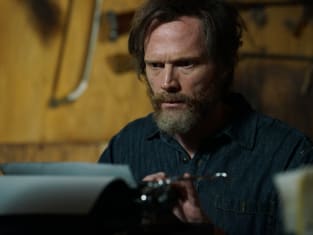Manhunt: UNABOMBER Season 1 Episode 6 Review: Ted
 Carissa Pavlica
at
.
Updated at
.
Carissa Pavlica
at
.
Updated at
.
Can Ted Kaczynski be held fully accountable for his actions when he was part of a diabolical experiment at the age of 16?
That's a very serious question that was brought to mind on Manhunt: UNABOMBER Season 1 Episode 6 as we learned a lot about the man responsible for the deadly mail bombings.
Nature vs. nurture is one of my favorite topics, and the adult Ted Kaczynski seems like the most unfortunate, brutal combination of both.
As we know, Ted didn't care for technology, so he wrong long letters to his brother, David, attempting to clear his mind while also information David of his many thoughts.
Ted's letters were more like missives, easily ten pages or more, complete with drawings, capital letters and repeated phrases to ensure his thoughts got across to David. No bold type for him, he had to do it the old fashioned way.
Using handwriting can also make your thoughts seem even more frenzied, as everything from the pressure on the paper to the slant of your writing adds to the tale you're telling. Ted's writings are all available to see, although I've restrained myself from looking.
From the thoughts swirling through his head during "Ted," it's easy to imagine what made it to paper would have been quite the sight.
Ted had a great love for his little brother as soon as he arrived, but like all of his family, he also struggled with that love. Very early, Ted seemed troubled, unable to cope with things other children could do easily.
As an adult, Ted only recalled having made one friend in his life at a time when friendships were difficult. He was intelligent and skipped a grade in school, thrusting him into an entirely new group of students, immediately making him an outsider.
Whether Ted really believed he was the smartest kid in the room at the time he was in the classroom couldn't have lent itself well to fostering friendships, but that's certainly how he looked back on the time.
Still, watching young Ted running free through the woods and behaving like a kid should was like looking into the last open window for Normal Ted's Life. When that friendship was betrayed, he lost hope for fostering friendships with people his own age.
Sadly, after skipping two years of education, Ted was also the outcast at college, two years younger than everyone else. It might seem like a good think on the outset because at least they weren't kids his own age.
But somehow Ted was suckered into and fostered a friendship with one of the most significant scientists of the 20th century, Professor Henry Murray. If there could have been a How-To Book for future criminals laid out, it's possible Murray's torturous experiments would have been included.
Ted sums it up well in his letter to David: all the other kids were 18 or 19, but I was just a 16-year-old kid.
It's hard watching the young, impressionable Ted warm up to an adult he trusts so emphatically knowing he's going to be torn down. It's even harder when you know a boy of that age will likely say anything to impress a man of Murray's stature, especially one as vulnerable as Ted.
Personally, I never understood the appeal of a woman's backside, except perhaps that of a negro.
It's even possible that by the time Ted was 16 and at Harvard he was showing signs of mental illness, perhaps paranoid schizophrenia. The thought that so little was done to ensure the candidates Murray cultivated were right for the process is highly unsettling.
Murray spent a year seducing me and then two years breaking me. Why did I keep going back? To prove to them that they could strap me into an electric chair, but I will never give in. They will never break me. And they didn't. I didn't break. They did no break me.
That first year, it seemed there was so much hope for Ted. Someone was listening to him and thought what he had to say mattered. This was from a kid who answered a questionnaire where every answer was about the rage and hatred he felt.
I wonder what his answers to the same questionnaire he took right at the beginning might have been if he took it again just before the day Murray shot his world out from under Ted.
Murray: I've taken the liberty of sharing those pages with a panel of fellow scientists, some of Harvard's most distinguished thinkers.
Ted: I'm flattered. [addressing the men] Good morning.
Murray: Unfortunately, conclusions were unanimous. They found the majority of your ideas to be derivative, cliche, and juvenile. The remainder they found self-evidently absurd.
The "letter from mom" Murray read was over the top. It seemed to me Murray had an ethical responsibility to tell his students their parents didn't say those things after they were put through such misery.
Maybe they were. It seems highly unlikely Ted or the others, as they were nothing but guinea pigs to Murray, were given any consideration whatsoever.
Is it ironic that Ted's subject code name was "Lawful"?
How about this: Henry Murray died eight years before Ted Kaczynski was captured and outed as the Unabomber, so Murray never had to suffer the consequences of knowing what he did to the three dead and 23 wounded and countless family and friends who suffered as a likely result of his experiments.
Because, yes, Ted's nature was precarious, but his nurture was impossible to deny. Nobody at the age of 16 understands what they are doing in the situation he entered, and no permission slip from his mother could cover it.
The result, an embittered man who spent his adult life shuttered away from others and unable to form social relationships, seeking recognition and viability by endangering and taking the lives of others is one of the most tragic stories America has ever produced.
Yet, it's also very beautiful.
It's beautiful because David, who turned in his brother, sure, didn't do it with malice. He did it to protect Ted, to ensure he would be safe. And David will never stop fighting for his brother. There is a deep and true bond there of love.
It's beautiful because Ted saw in himself what he was and knew he was supposed to be more.
My life wasn't supposed to go like this. My God, David, who can help me? It wasn't supposed to go like this.
He wanted to change was powerless against the changes that occurred in his adolescent brain to fully fight against the grain.
A very intelligent and compassionate man who one moment can tell a teenage boy it takes incredible strength and courage to be different and knows in his heart that's the truth, not to fight, but to remains strong, the next runs from the boy's party because of his own differences.
It just played out that he'd rather send a mail bomb to vent his frustrations and try to get a piece of the life he felt he was denied than to venture further into the world and fight his base instinct to retreat so he can have that family he so deeply desires.
He's a man at war with himself without the capacity to set himself free because he's too damaged to reconcile his nature and nurture, which are too tightly woven to ever untangle.
It's horrific, but not without more if you know where to look.
And let's not forget, another man created an entirely new line of forensics to find Ted Kaczynski. The man who was the focus of this hour is so unique he needed another equally unique man spirited enough and willing to fight to him on equal terms to find him.
As destructive and terrifying as it was, the good that came out of it for the future did a lot to stop others from ever getting as far as Ted.
With the exception of his dancing outside the cabin, I forgot I was watching Paul Bettany at Ted Kaczynski. His performance as the bedraggled man who so clearly wants to be someone other the man he has become is wonderful.
John Berchtold as the 16-year-old Ted was equally as powerful, and the two actors helped paint a portrait of a conflicted and damaged man who did heinous things instead of a monster. Understanding is a much more persuasive tool than sheer condemnation.
If you've missed the parts about forensic linguistics, catch up when you watch Manhunt: UNABOMBER online. Two more to go!!
Carissa Pavlica is the managing editor and a staff writer and critic for TV Fanatic. She's a member of the Critic's Choice Association, enjoys mentoring writers, conversing with cats, and passionately discussing the nuances of television and film with anyone who will listen. Follow her on X and email her here at TV Fanatic.







